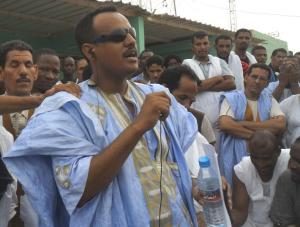The history of spying and being spied upon is as old as dirt, but lately there’s this feeling that, left unchecked for too long, it’s got out of hand. We have an equally long history of allowing previous chances to pay attention slip from our grasp. Looking back just a few years, ECHELON is one example:

Global system for the interception of private and commercial communications (ECHELON)
From the European Parliament website Report (11 July 2001) on the existence of a global system for the interception of private and commercial communications (ECHELON interception system):
The system known as ‘ECHELON’ is an interception system which differs from other intelligence systems in that it possesses two features which make it quite unusual:
The first such feature attributed to it is the capacity to carry out quasi-total surveillance. Satellite receiver stations and spy satellites in particular are alleged to give it the ability to intercept any telephone, fax, Internet or e-mail message sent by any individual and thus to inspect its contents.
The second unusual feature of ECHELON is said to be that the system operates worldwide on the basis of cooperation proportionate to their capabilities among several states (the UK, the USA, Canada, Australia and New Zealand), giving it an added value in comparison to national systems: the states participating in ECHELON (UKUSA states(8)) can place their interception systems at each other’s disposal, share the cost and make joint use of the resulting information. This type of international cooperation is essential in particular for the worldwide interception of satellite communications, since only in this way is it possible to ensure in international communications that both sides of a dialogue can be intercepted. It is clear that, in view of its size, a satellite receiver station cannot be established on the territory of a state without that state’s knowledge. Mutual agreement and proportionate cooperation among several states in different parts of the world is essential.
Possible threats to privacy and to businesses posed by a system of the ECHELON type arise not only from the fact that is a particularly powerful monitoring system, but also that it operates in a largely legislation-free area. Systems for the interception of international communications are not usually targeted at residents of the home country. The person whose messages were intercepted would have no domestic legal protection, not being resident in the country concerned. Such a person would be completely at the mercy of the system. Parliamentary supervision would also be inadequate in this area, since the voters, who assume that interception ‘only’ affects people abroad, would not be particularly interested in it, and elected representatives chiefly follow the interests of their voters. That being so, it is hardly surprising that the hearings held in the US Congress concerning the activities of the NSA were confined to the question of whether US citizens were affected by it, with no real concern expressed regarding the existence of such a system in itself. It thus seems all the more important to investigate this issue at European level.
(my emphasis)
As this excerpt illustrates, there is an established, ongoing programme of mutual cooperation, and individual citizens of their respective countries don’t make a fuss because they wrongly assume they are not targets. The hidden truth here is really sad: neither government or people are concerned about bad stuff happening in other countries. We’re fine with investing, trading, travelling, or studying abroad, but if there’s a problem, we want to scurry home and pull up the drawbridge.
More recently, we heard about “PROMIS” – for example, in this post from 2006 which states:
“National Security Agency (NSA) computers have been downloading financial and personal files of all American citizens as a result of upgrades to the Echelon satellite network and software program which is part of the Prosecutor’s Management Information System (PROMIS).
SOG says that NSA also has a “7-10 second lead time” which effectively affords the agency the opportunity to delay the release of currency, stock and bond sales transactions which permits a criminal advantage to agency officials and other high-level associates who game the system of the world’s financial markets”
(my emphasis)
These historic reports explain why so many people, myself included, maintain that the current media revelations about PRISM are not actually news. We have been aware for some time that nothing and no one is “safe” from prying electronic eyes. For most of us, this issue is not about having “something to hide”: it’s about exercising the right to go about your business and not have your private and personal life intruded on without good reason by anyone, and especially not the government that is supposed to serve you. Worse, and decidedly more underhand, is the notion of another country’s government spying on you, then sharing that information with your government in some shady secret information exchange deal. It is about being innocent until proven guilty in a public court of law, with the right to defend yourself. Basically, we don’t want our phone conversations, correspondence or bank accounts to be the target of extrajudicial electronic snooper drones. We don’t want government more loyal to its clandestine relationships with other countries than to the electorate.
 If you were not previously aware, or not focussed on these risks, you can thank Edward Snowden and the media coverage of PRISM for bringing these concerns to the front page.The PRISM reports are being issued with exceptionally useful timing, coinciding initially with meetings between China and the US, and then just ahead of the G8 summit. This inevitably leads to speculation over why non-news is being pushed so hard, and whether there is an alternative agenda. We can’t know for sure what the deal is with these PRISM revelations, we can only throw around a few guesses or wait for more information to come to light. There are several possibilities being mulled over, from diverting attention away from other news items, to inciting civil unrest and manufacturing dissent among grassroots movements on a par with the Occupy protests. Proponents of the latter point out that Edward Snowden’s story also contains some subtle, and not so subtle, messages targeting anti-establishment activists. For example, reports mention he had an Electronic Frontier Foundation bumper sticker on his laptop lid, and his responses in the Guardian’s Q&A include a plug for an upcoming “Restore The Fourth Amendment” 4 July march. The main thing to keep in mind is that all news must be regarded with a critical if not cynical eye. There is enough evidence of news being used to misdirect and manipulate popular opinion; what matters is how, and if, we choose to react.
If you were not previously aware, or not focussed on these risks, you can thank Edward Snowden and the media coverage of PRISM for bringing these concerns to the front page.The PRISM reports are being issued with exceptionally useful timing, coinciding initially with meetings between China and the US, and then just ahead of the G8 summit. This inevitably leads to speculation over why non-news is being pushed so hard, and whether there is an alternative agenda. We can’t know for sure what the deal is with these PRISM revelations, we can only throw around a few guesses or wait for more information to come to light. There are several possibilities being mulled over, from diverting attention away from other news items, to inciting civil unrest and manufacturing dissent among grassroots movements on a par with the Occupy protests. Proponents of the latter point out that Edward Snowden’s story also contains some subtle, and not so subtle, messages targeting anti-establishment activists. For example, reports mention he had an Electronic Frontier Foundation bumper sticker on his laptop lid, and his responses in the Guardian’s Q&A include a plug for an upcoming “Restore The Fourth Amendment” 4 July march. The main thing to keep in mind is that all news must be regarded with a critical if not cynical eye. There is enough evidence of news being used to misdirect and manipulate popular opinion; what matters is how, and if, we choose to react.
Who is Edward Snowden, and why should you care? He is being hailed as a hero by some, a traitor by others, and even an actor of sorts. Apart from establishing his credibility, there is really no good reason to form an obsession about Edward Snowden, especially if that diverts attention away from the far more important content of his message.
Did he really work for the US Government? Evidence that he did can be gleaned from a comment Snowden posted on the Ars Technica forum back in 2006, when he was considering his preferences for being sent overseas for two years on assignment:
“Although I’m not a diplomat, I work for the Department of State. I actually signed up because of the opportunity for foreign travel […] I also don’t see the allure of “Scandinavian” countries, but that’s simply because I don’t want to live in a country where warmth and comfort are only spoken of in bedtime stories. China is definitely a good option career-wise, and I’ve already got a basic understanding of Mandarin and the culture, but it just doesn’t seem like as much “fun” as some of the other places. Who knows where the “needs of the service” will actually end up placing me, though. Azerbaijan, anyone?
“
Despite his preferences, Snowden was apparently posted to Geneva. Since he already knew some Mandarin, I think that makes Hong Kong a less surprising choice of venue for his initial exile. Snowden may not like cold countries, but a lot has changed since 2006. Perhaps global warming can take care of the rest.
Is he now a wanted criminal? Despite reports that US government is angered by Snowden’s whistleblowing, it has yet to issue an international arrest warrant, meaning he should be free to travel anywhere, with the possible exception of the United States.
Related articles
- To the Guardian – why PRISM? ECHELON has been around since 1948 supported by US, UK, Canada, Australia (thebankwatch.com)
- SOTT FOCUS: Through the PRISM of public amnesia (sott.net)
- Skynet to Launch October, 2013 (activistpost.com)
- Guardian Exclusive #2 Today: GCHQ intercepted foreign politicians’ communications at G20 summits (Snowden leaks) (12160.info)
*Featured image for this post is from a platoon page on the “Battlefield 3” gaming website for the Tom Clancy Splinter Cell MMO‘s “Third Echelon“.









